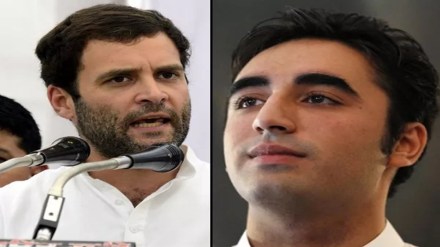An unforeseen consequence of Operation Sindoor has been that South Asia’s two poster boys of dynastic democracy surfaced and made fools of themselves. I speak of Bilawal Bhutto and Rahul Gandhi. They would not be considered political leaders at all if it were not for their illustrious surnames. As someone who believes dynastic succession should have ended when feudalism did, I watched the performance of these two political princes with real interest.
The first performance came from Bilawal Bhutto, who made a speech on the banks of the Indus a day after India decided to suspend the Indus Water Treaty. In this speech, he threatened that either water would flow down the Indus or the “blood of our enemies”. His Urdu remains bad, so he used melodrama to compensate and, in the manner of a crazed messiah, shrieked “the Indus has always been ours, is ours, and will be ours”. This one speech was proof that not only was the heir to the mighty Bhutto dynasty linguistically challenged, but that he was politically challenged as well. But Pakistan’s military rulers were clearly impressed with his performance and sent him off to Washington to convince people that it was Pakistan that was the victim of terrorism and that India’s allegations were lies.
It took Shashi Tharoor, who was also in Washington, one minute to demolish the narrative that Zulfikar Ali Bhutto’s heir was trying to weave. Tharoor said he sympathised with Bilawal because his mother had been killed by jihadi terrorists, but he seemed to have forgotten Hillary Clinton’s warning to Pakistan. If you breed vipers in your backyard, you cannot expect that they will only attack your neighbour. Pakistan’s terrorists are home-bred.
Last week came a performance from the heir to our own storied dynasty. Rahul has, since Operation Sindoor, made statements that have been applauded in Pakistan even by Hafiz Saeed. But last week, he outdid himself. In the manner of a schoolboy discussing a cricket match, and with a sneery grin on his face, he imitated Donald Trump having a conversation with our prime minister on the phone and saying “Narendra, surrender”. And then he mimicked Narendra Modi saying “ji huzoor”.
The point the leader of the opposition was trying to make was that when his grandmother was prime minister, the Seventh Fleet was sent by Richard Nixon to warn her that breaking up Pakistan would have consequences. And she had courageously remained fixed on the course that she had set. A dangerous analogy to evoke, because Indira Gandhi also ended up snatching defeat from the jaws of victory (to use that useful cliché) by signing the Simla Agreement. All the cards were in India’s hands. There were more than 90,000 prisoners of war in the custody of the Indian Army, so she could have told Bhutto that there would be no agreement without a signed guarantee that the Kashmir issue would end now. Instead, the agreement has a feeble reference to Kashmir being decided bilaterally. Years later, I happened to learn from a close associate of Bhutto that he boasted afterwards that he had outdone her.
What exactly was the point that Indira’s grandson was trying to make? Was he trying to prove the debunked falsehood that Modi agreed to a ceasefire because of pressure from Trump? Was he trying to say that the war should have continued indefinitely? Or was he trying to say what Congress spokespersons have said in TV debates, which is that the war should have continued until Pakistan is broken up once more? This was never the objective of Operation Sindoor. It had the limited objective of destroying Pakistan’s terrorist infrastructure and from all accounts this objective was achieved.
To return, though, to the poster boys of dynastic democracy. Bilawal has lost his relevance in Pakistani politics and is now merely a spokesman for the military men who control the political chessboard. Rahul remains relevant because he is fully in control of our oldest political party. And the only national party, we have other than the BJP. We have no choice but to take what he says seriously, which is why it is worrying that he continues to sound like a schoolboy with a special grudge against Modi for daring to usurp India, which he considers his birthright to rule since his family once did.
It is this idea that India remains the private property of the Dynasty that is destroying the Congress Party. If you have been following recent events, you would have noticed that the Congress leaders in the parliamentary delegations have done an extremely good job. The only people who have let the party down are those who constitute the coterie around our own poster boy of dynastic democracy.
It could be time for those who want Congress to survive and thrive to come together and urge the Dynasty’s heirs to consider playing the role that the chairman emeritus plays in companies. If they agree, they can continue to have relevance in the family firm, but can move away from playing an active role. How long does the Congress Party want to pretend that Rahul is its prime minister-in-waiting when he has been unable to win a single Lok Sabha election for the party? One way or another dynastic democracy is a bad idea. And it is abundantly obvious that India’s voters saw this before our political leaders have.
